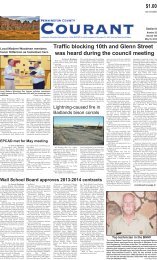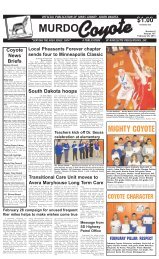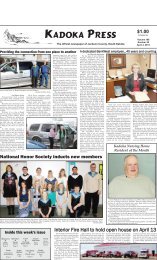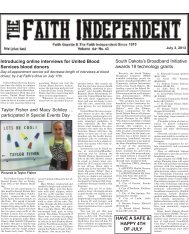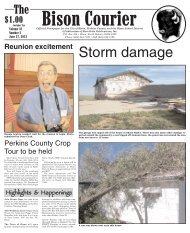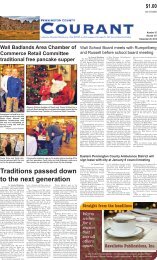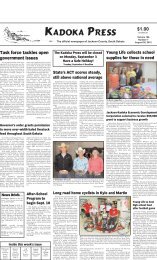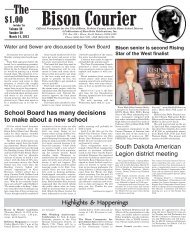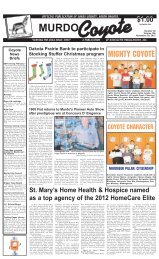E-Coyote_10-11-12_Layout 1.pdf - Pioneer Review
E-Coyote_10-11-12_Layout 1.pdf - Pioneer Review
E-Coyote_10-11-12_Layout 1.pdf - Pioneer Review
Create successful ePaper yourself
Turn your PDF publications into a flip-book with our unique Google optimized e-Paper software.
Public Notices Murdo <strong>Coyote</strong> • October <strong>11</strong>, 20<strong>12</strong> • Page 7<br />
20<strong>12</strong> Constitutional<br />
Amendments<br />
The following amendments to the State<br />
Constitution are submitted to the voters<br />
by the Legislature. The amendments will<br />
not become effective unless approved by<br />
majority vote.<br />
Constitutional<br />
Amendment M<br />
Title: An Amendment to the South Dakota<br />
Constitution regarding certain provisions<br />
relating to corporations.<br />
Attorney General Explanation: The<br />
Constitution currently contains certain<br />
restrictions on the Legislature’s authority<br />
to enact laws regarding corporations.<br />
For example, corporate directors must<br />
be elected by cumulative voting, in which<br />
a shareholder may choose to cast all<br />
votes for a single candidate or spread<br />
the votes among two or more candidates.<br />
Corporate stock or bonds may<br />
only be issued for money, labor or property<br />
received by the corporation. Corporate<br />
stock or debt may not be increased<br />
without prior notice to and consent of<br />
current stockholders.<br />
Constitutional Amendment M removes<br />
these restrictions, and allows the Legislature<br />
to: (1) authorize alternative methods<br />
of voting in elections for corporate<br />
directors; (2) expand the types of contributions<br />
a corporation may receive for the<br />
issuance of stock or bonds; and (3)<br />
establish procedures governing the<br />
increase of corporate stock or debt.<br />
A vote “Yes” will remove the constitutional<br />
restrictions.<br />
A vote “No” will leave the Constitution as<br />
it is.<br />
Full Text of Constitutional Amendment<br />
M:<br />
That Article XVII, section 1 of the Constitution<br />
of the State of South Dakota, be<br />
amended to read as follows:<br />
§ 1. No corporation shall be created or<br />
have its charter extended, changed or<br />
amended by special laws, except those<br />
for charitable, educational, penal or<br />
reformatory purposes, which are to be<br />
and remain under the patronage and<br />
control of the state; but the Legislature<br />
shall provide, by general laws, for the<br />
organization of all corporations hereafter<br />
to be created. The Legislature shall have<br />
the authority to enact laws governing the<br />
operation and dissolution of corporations.<br />
That Article XVII, section 5 of the Constitution<br />
of the State of South Dakota, be<br />
amended to read as follows:<br />
§ 5. In all elections for directors or managers<br />
of a corporation, each member or<br />
shareholder may cast the whole number<br />
of his votes for one candidate, or distribute<br />
them upon two or more candidates,<br />
as he may prefer votes in the manner<br />
consistent with laws enacted by the Legislature.<br />
That Article XVII, section 8 of the Constitution<br />
of the State of South Dakota, be<br />
amended to read as follows:<br />
§ 8. No corporation shall issue stocks<br />
or bonds except for money, labor done,<br />
or money or property actually received,<br />
or for the reasonable value of other contribution<br />
to the corporation; and all fictitious<br />
increase of stock or indebtedness<br />
shall be void. The stock and indebtedness<br />
of corporations shall not be<br />
increased except in pursuance of general<br />
law, nor without the consent of the persons<br />
holding the larger amount in value<br />
of the stock first obtained, at a meeting to<br />
be held after sixty days notice given in<br />
pursuance of law the manner consistent<br />
with laws enacted by the Legislature.<br />
Constitutional<br />
Amendment N<br />
Title: An Amendment to the South Dakota<br />
Constitution repealing certain reimbursement<br />
restrictions for travel by legislators<br />
to and from a legislative session.<br />
Attorney General Explanation: The<br />
Constitution fixes the mileage reimbursement<br />
rate for legislators at five cents per<br />
mile for their travel to and from a legislative<br />
session.<br />
Constitutional Amendment N repeals this<br />
constitutional limitation and allows legislator<br />
travel reimbursement to be set by<br />
the Legislature.<br />
A vote “Yes” will eliminate the fixed travel<br />
reimbursement rate.<br />
A vote “No” will leave the Constitution as<br />
it is.<br />
Full Text of Constitutional Amendment<br />
N:<br />
That Article III, section 6 of the Constitution<br />
of the State of South Dakota, be<br />
amended to read as follows:<br />
§ 6. The terms of office of the members<br />
of the Legislature shall be two years;<br />
they legislators shall receive for their<br />
services the salary fixed by law under the<br />
provisions of § 2 of article XXI of this<br />
Constitution, and five cents for every<br />
mile of necessary travel in going to and<br />
returning from the place of meeting of the<br />
Legislature on the most usual route.<br />
No person may serve more than four<br />
consecutive terms or a total of eight consecutive<br />
years in the senate and more<br />
than four consecutive terms or a total of<br />
eight consecutive years in the house of<br />
representatives. However, this restriction<br />
does not apply to partial terms to which a<br />
legislator may be appointed.<br />
A regular session of the Legislature shall<br />
be held each year and shall not exceed<br />
forty legislative days, excluding Sundays,<br />
holidays and legislative recess,<br />
except in cases of impeachment, and<br />
members of the Legislature shall receive<br />
no other pay or perquisites except salary<br />
and mileage.<br />
Constitutional<br />
Amendment O<br />
Title: An Amendment to the South Dakota<br />
Constitution changing the method for<br />
distributions from the cement plant trust<br />
fund.<br />
Attorney General Explanation: In<br />
2001, the $238 million in proceeds from<br />
the sale of the state cement plant were<br />
placed in a constitutionally created trust<br />
fund. Currently, the Constitution requires<br />
a yearly transfer of $<strong>12</strong> million from the<br />
cement plant trust fund to the state general<br />
fund. In addition, under certain circumstances<br />
the Legislature must authorize<br />
distributions of cement plant trust<br />
fund earnings for the support of education.<br />
Amendment O replaces the existing<br />
method for cement trust fund distributions.<br />
The amendment would require a<br />
yearly transfer of 4% of the market value<br />
of the cement plant trust fund to the state<br />
general fund for the support of education.<br />
A vote “Yes” is for changing the method<br />
for distributions from the cement plant<br />
trust fund.<br />
A vote “No” will leave the Constitution as<br />
it is.<br />
Full Text of Constitutional Amendment<br />
O:<br />
That Article XIII, section 20 of the Constitution<br />
of the State of South Dakota, be<br />
amended to read as follows:<br />
§ 20. The net proceeds derived from<br />
the sale of state cement enterprises shall<br />
be deposited by the South Dakota<br />
Cement Commission in a trust fund hereby<br />
created to benefit the citizens of<br />
South Dakota. The South Dakota Investment<br />
Council or its successor shall<br />
invest the trust fund in stocks, bonds,<br />
mutual funds, and other financial instruments<br />
as provided by law. Each fiscal<br />
year beginning in fiscal year 2001, a<br />
transfer of twelve million dollars shall be<br />
made from the trust fund to the state<br />
general fund as provided by law.<br />
That Article XIII, section 21 of the Constitution<br />
of the State of South Dakota, be<br />
amended to read as follows:<br />
§ 21. Except as provided in Article XIII,<br />
section 20 of the Constitution of the State<br />
of South Dakota, the original principal of<br />
the trust fund shall forever remain inviolate.<br />
However, the The Legislature shall,<br />
by appropriation, make distributions from<br />
the difference between the twelve million<br />
dollar annual general fund transfer and<br />
five percent of the market value of the<br />
trust fund for the support of education,<br />
but not for the replacement of state aid to<br />
general education or special education, if<br />
the increase in the market value of the<br />
trust fund in that fiscal year was sufficient<br />
to maintain the original principal of the<br />
trust fund after such distributions. Beginning<br />
with fiscal year 2006, the market<br />
value of the trust fund shall be determined<br />
by adding the market value of the<br />
trust fund at the end of the sixteen most<br />
recent calendar quarters, and dividing<br />
that sum by sixteen transfer from the<br />
trust fund to the state general fund four<br />
percent of the lesser of the average market<br />
value of the trust fund determined by<br />
adding the market value of the trust fund<br />
at the end of the sixteen most recent calendar<br />
quarters as of December thirtyfirst<br />
of that year and dividing that sum by<br />
sixteen, or the market value of the trust<br />
fund at the end of that calendar year for<br />
the support of education in South Dakota.<br />
The transfer shall be made prior to<br />
June thirtieth of the subsequent calendar<br />
year.<br />
Constitutional<br />
Amendment P<br />
Title: An Amendment to the South Dakota<br />
Constitution adding balanced budget<br />
requirements.<br />
Attorney General Explanation: While<br />
the constitution currently restricts the<br />
State from incurring debt, it does not<br />
expressly require the State to have a balanced<br />
budget. Amendment P requires<br />
the Governor to propose a balanced<br />
budget. In addition, Amendment P prohibits<br />
legislative appropriations from<br />
exceeding anticipated revenues and<br />
existing available funds. The amendment<br />
is not intended to affect other constitutional<br />
provisions<br />
A vote “Yes” will include balanced budget<br />
requirements in the Constitution.<br />
A vote “No” will leave the Constitution as<br />
it is.<br />
Full Text of Constitutional Amendment<br />
P:<br />
That Article XII of the Constitution of the<br />
State of South Dakota, be amended by<br />
adding a NEW SECTION to read as follows:<br />
§ 7. The Governor shall propose a budget<br />
in which expenditures or appropriations<br />
may not exceed anticipated revenue<br />
and existing funds available for<br />
expenditure or appropriation. Appropriations<br />
by the Legislature may not exceed<br />
anticipated revenue and existing funds<br />
available for expenditure or appropriation.<br />
Nothing in this section is intended to<br />
limit, restrict, expand, modify, or otherwise<br />
affect any other provision of this<br />
Constitution, including Article XIII.<br />
20<strong>12</strong> Initiated Measure<br />
The following initiated measure was proposed<br />
by petition for submission to the<br />
voters. This initiated measure will not<br />
become effective unless approved by<br />
majority vote.<br />
Initiated Measure 15<br />
Title: An initiated measure to increase<br />
state general sales and use taxes for<br />
additional K-<strong>12</strong> public education and<br />
Medicaid funding<br />
Attorney General Explanation: The initiated<br />
measure increases the state general<br />
sales and use tax rate from 4% to<br />
5%. The additional tax revenue will be<br />
split evenly between K-<strong>12</strong> public education<br />
and Medicaid. The education funds<br />
will be provided to school districts based<br />
on enrollment, to be spent on improving<br />
education as school boards determine.<br />
The Medicaid funds will be spent only on<br />
payments to Medicaid providers and<br />
related state expenses.<br />
The additional funds cannot replace or<br />
reduce state funding levels set for fiscal<br />
year 20<strong>12</strong> relating to existing Medicaid<br />
and K-<strong>12</strong> public education programs,<br />
including state aid to education. Currently,<br />
state aid is to be adjusted annually by<br />
3% or the rate of inflation, whichever is<br />
less. Under the measure, this annual<br />
adjustment cannot exceed the growth<br />
rate in state general fund revenues. Any<br />
resulting shortfall in state aid will be<br />
made up in subsequent years.<br />
A vote “Yes” is for the proposed law.<br />
A vote “No” is against the proposed law.<br />
Full Text of Initiated Measure 15:<br />
1. Commencing January 1, 2013, twenty<br />
percent of the monies collected pursuant<br />
to the South Dakota sales and use taxes<br />
imposed by SDCL chapters <strong>10</strong>-45 and<br />
<strong>10</strong>-46 shall be placed in a special fund<br />
known as the Moving South Dakota Forward<br />
fund. The monies in the Moving<br />
South Dakota Forward fund shall be allocated<br />
into the following two subfunds<br />
within the Moving South Dakota Forward<br />
fund (1) fifty percent shall be allocated to<br />
the Moving K-<strong>12</strong> Education Forward subfund;<br />
and (2) fifty percent shall be allocated<br />
to the Moving Healthcare Forward<br />
subfund.<br />
2. Monies allocated in Section 1 of this<br />
initiated measure shall be disbursed as<br />
follows:<br />
(1) Monies in the Moving K-<strong>12</strong> Education<br />
Forward sub-fund are continuously<br />
appropriated to the public school districts<br />
of South Dakota, to be distributed pro<br />
rata based upon each school district’s<br />
relative share of fall enrollment as<br />
defined in SDCL chapter 13-13, compared<br />
to the fall enrollment of all school<br />
districts. Funds deposited in the Moving<br />
K-<strong>12</strong> Education Forward subfund in the<br />
preceding calendar quarter shall be distributed,<br />
provided above, to the public<br />
school districts of South Dakota by the<br />
first business day of February, May,<br />
August, and November of each year,<br />
commencing May 1, 2013. Funds<br />
received by a school district form the<br />
Moving K-<strong>12</strong> Education Forward subfund<br />
shall be used at the sole discretion of the<br />
public school district’s governing board<br />
for the purpose of improving public education;<br />
(2) Eighty percent of the monies in the<br />
Moving Healthcare Forward subfund<br />
shall be spent only for the purpose of<br />
funding payments to providers to the<br />
South Dakota Medicaid program, which<br />
are incurred due to increases in expenses<br />
related to the reimbursement rates<br />
paid to service providers per unit of service<br />
in excess of such reimbursement<br />
rates in effect as of July 1, 20<strong>11</strong>; and<br />
(3) Twenty percent of the monies in the<br />
Moving Health Care Forward subfund<br />
shall be spent only for the purpose of<br />
funding expenses related to payments to<br />
providers to the South Dakota Medicaid<br />
Program, which are incurred due to<br />
increases in the case load volume experienced<br />
by the South Dakota Medicaid<br />
program from the case levels as of July<br />
1, 20<strong>11</strong>.<br />
3. No monies deposited in the Moving K-<br />
<strong>12</strong> Education Forward subfund may be<br />
spent in any way, either directly or indirectly,<br />
to reduce, supplant, or replace<br />
appropriations for any state K-<strong>12</strong> education<br />
program in existence for state fiscal<br />
year 20<strong>12</strong>, including specifically the state<br />
aid to education and special education<br />
programs established in SDCL chapters<br />
13-13 and 13-37. The per student allocation<br />
in SDCL chapter 13-13 and the per<br />
student allocation for each specified disability<br />
in SDCL chapter 13-37 shalll be<br />
adjusted by the annual application of<br />
their respective index factors, as set forth<br />
in SDCL subdivisions 13-13-<strong>10</strong>.1(3) and<br />
13-37-35.1(6), as in effect on July 1,<br />
20<strong>11</strong>. However, the index factor adjustment<br />
shall, in no case, exceed the actual<br />
percentage growth in state general<br />
fund revenues for the most recently completed<br />
fiscal year. If the percentage<br />
growth in state general fund revenues is<br />
less than the index factor sin any year,<br />
the difference shall be made up in the<br />
immediately following years to the extent<br />
the percentage growth in state general<br />
fund revenues exceeds the index factors.<br />
4. No monies deposited in the Moving<br />
Health Care Forward subfund may be<br />
spent in any way, either directly or indirectly,<br />
to reduce, supplant, or replace<br />
state appropriations for any state Medicaid<br />
program in existence for state fiscal<br />
year 20<strong>12</strong>.<br />
5. Effective January 1, 2013, any sales<br />
or use tax imposed at a rate of four percent<br />
by the provisions of SDCL chapters<br />
<strong>10</strong>-45 or <strong>10</strong>-46 are hereby increased by<br />
one percent each to a total rate of five<br />
percent each.<br />
20<strong>12</strong> Referred Laws<br />
The following laws were adopted by the<br />
Legislature and referred to the voters by<br />
petition. These laws will not become<br />
effective unless approved by majority<br />
vote.<br />
Referred Law 14<br />
Title: An Act to establish the Large Project<br />
Development Fund.<br />
Attorney General Explanation: The<br />
referred law establishes the “Large Project<br />
Development Fund.” Beginning January<br />
1, 2013, 22% of contractors’ excise<br />
tax revenues would be transferred from<br />
the state general fund to the Large Project<br />
Development Fund.<br />
The South Dakota Board of Economic<br />
Development would use Large Project<br />
Development Fund monies to provide<br />
grants for the construction of large economic<br />
development projects within the<br />
state. To be eligible, a project must have<br />
a cost exceeding $5 million. Examples<br />
of eligible projects include laboratories<br />
and facilities for testing, manufacturing,<br />
power generation, power transmission,<br />
agricultural processing, and wind energy.<br />
Examples of ineligible projects include<br />
retail establishments; residential housing;<br />
and facilities for lodging, health care<br />
services and the raising or feeding of<br />
livestock.<br />
A vote “Yes” is for the establishment of<br />
the Large Project Development Fund.<br />
A vote “No” is against the referred law.<br />
Full Text of Referred Law 14:<br />
Section 1. That § 1-16G-1.2 be amended<br />
to read as follows:<br />
1-16G-1.2. The Board of Economic<br />
Development may take title by foreclosure<br />
to any property given as security if<br />
the acquisition is necessary to protect<br />
any economic development grant or loan<br />
or any large project development grant<br />
made under pursuant to the provisions of<br />
this chapter, and may sell, transfer, or<br />
convey any such property to any responsible<br />
buyer. Any sale of property hereunder<br />
pursuant to the provisions of this<br />
chapter shall be performed in a commercially<br />
reasonable manner. If the sale,<br />
transfer, or conveyance cannot be effected<br />
with reasonable promptness, the<br />
board may, in order to prevent financial<br />
loss and sustain employment, lease the<br />
property to a responsible tenant or tenants.<br />
All sale proceeds or lease payments<br />
received by the board pursuant to this<br />
section shall be deposited in the fund<br />
from which the original grant or loan was<br />
made.<br />
Section 2. That § 1-16G-8 be amended<br />
to read as follows:<br />
1-16G-8. The Board of Economic Development<br />
shall promulgate rules pursuant<br />
to chapter 1-26 concerning the following:<br />
(1) The existing barriers to economic<br />
growth and development in the state;<br />
(2) Developing investment in research<br />
and development in high technology<br />
industries;<br />
(3) The submission of business plans<br />
prior to the approval of economic development<br />
grants or loans or large project<br />
development grants. Business plans<br />
shall include the products or services to<br />
be offered by the applicant, job descriptions<br />
with attendant salary or wage information<br />
by job category, educational<br />
requirements by job category, methods<br />
of accounting, financing other than that<br />
provided by the economic development<br />
grant or loan or a large project development<br />
grant, and marketing, sales, merchandising,<br />
and other disciplines proposed<br />
to be used for business growth<br />
and expansion;<br />
(4) The cooperation between agencies<br />
of state government and applicant businesses<br />
for nonfinancial services including<br />
loan packaging, marketing assistance,<br />
research assistance, and assistance<br />
with finding solutions for complying<br />
with environmental, energy, health, safety,<br />
and other federal, state, and local<br />
laws and regulations;<br />
(5) Regular performance monitoring and<br />
reporting systems for participating businesses<br />
to assure compliance with their<br />
business plans and, terms of repayment<br />
of an economic development loan and<br />
compliance with terms of an economic<br />
development grant or a large project<br />
development grant;<br />
(6) Establish eligibility criteria for grants<br />
and loans;<br />
(7) Establish application procedures for<br />
grants and loans, including a requirement<br />
that grant and loan applications be<br />
signed under penalty of perjury;<br />
(8) Establish criteria to determine which<br />
applicants will receive grants or loans;<br />
(9) Govern the use of proceeds of<br />
grants and loans;<br />
(<strong>10</strong>) Establish criteria for the terms and<br />
conditions upon which loans shall be<br />
made, including matching requirements,<br />
interest rates, repayment terms, and the<br />
terms of security given to secure such<br />
loans; and<br />
(<strong>11</strong>) Establish criteria for the terms and<br />
conditions upon which grants shall be<br />
made, including permitted uses, performance<br />
criteria, and matching requirements;<br />
and<br />
(<strong>12</strong>) Establish criteria for the terms and<br />
conditions upon which grants shall be<br />
repaid for noncompliance with the terms<br />
and conditions upon which the grant was<br />
made.<br />
Section 3. That § 1-16G-16.1 be<br />
amended to read as follows:<br />
1-16G-16.1. The Board of Economic<br />
Development may use the revolving economic<br />
development and initiative fund for<br />
the purpose of paying taxes and liens<br />
and for the procuring of legal services<br />
and other services necessary to protect,<br />
recover, maintain, and liquidate the<br />
assets of the revolving economic development<br />
and initiative fund and the large<br />
project development fund. Such costs<br />
may be incurred and paid up to ten percent<br />
of the loan or grant balance with a<br />
majority vote of the board of economic<br />
development. Costs in excess of ten percent<br />
shall be approved by a two-thirds<br />
vote of the board. Such services are not<br />
subject to state bid laws so long as such<br />
services are procured in a commercially<br />
acceptable manner.<br />
Section 4. That chapter 1-16G be<br />
amended by adding thereto a NEW<br />
SECTION to read as follows:<br />
Terms used in this Act Mean:<br />
(1) "Large project," a project with a total<br />
project cost exceeding five million dollars;<br />
and<br />
(2) "Project cost," the amount paid in<br />
money, credits, property, or other<br />
money's worth for a project.<br />
Section 5. That chapter 1-16G be<br />
amended by adding thereto a NEW<br />
SECTION to read as follows:<br />
For the purposes of this Act, the term,<br />
project, means a new building or structure<br />
or the expansion of an existing building<br />
or structure, the construction of which<br />
is subject to the contractor's excise tax<br />
imposed by chapters <strong>10</strong>-46A or <strong>10</strong>-46B.<br />
A project includes laboratory and testing<br />
facilities, manufacturing facilities, power<br />
generation facilities, power transmission<br />
facilities, agricultural processing facilities,<br />
and wind energy facilities. A project<br />
does not include any building or structure:<br />
(1) Used predominantly for the sale of<br />
products at retail, other than the sale of<br />
electricity at retail, to individual consumers;<br />
(2) Used predominantly for residential<br />
housing or transient lodging;<br />
(3) Used predominantly to provide<br />
health care services;<br />
(4) Constructed for raising or feeding of<br />
livestock; or<br />
(5) That is not subject to ad valorem real<br />
property taxation or equivalent taxes<br />
measured by gross receipts.<br />
Section 6. That chapter 1-16G be<br />
amended by adding thereto a NEW<br />
SECTION to read as follows:<br />
There is established in the state treasury<br />
a fund to be known as the large project<br />
development fund for the purpose of<br />
making grants for large project development.<br />
Section 7. That chapter 1-16G be<br />
amended by adding thereto a NEW<br />
SECTION to read as follows:<br />
The Board of Economic Development<br />
may make grants from the large project<br />
development fund for the purpose of promoting<br />
large project development in<br />
South Dakota.<br />
Section 8. That chapter 1-16G be<br />
amended by adding thereto a NEW<br />
SECTION to read as follows:<br />
All money in the fund is hereby appropriated<br />
for the purpose of making grants as<br />
provided in this Act. Any repayment of<br />
grants from the large project development<br />
fund and any interest thereon shall<br />
be receipted into the large project development<br />
fund.<br />
Section 9. That chapter 1-16G be<br />
amended by adding thereto a NEW<br />
SECTION to read as follows:<br />
The Board of Economic Development<br />
may accept and expend for the purposes<br />
of sections 6 and 7 of this Act, inclusive,<br />
any funds obtained from federal sources,<br />
gifts, contributions, or any source if such<br />
acceptance and expenditure is approved<br />
in accordance with § 4-8B-<strong>10</strong>.<br />
Section <strong>10</strong>. That chapter 1-16G be<br />
amended by adding thereto a NEW<br />
SECTION to read as follows:<br />
There is hereby continuously appropriated<br />
to the large project development fund<br />
the amount of twenty-two percent of all<br />
deposits into the general fund of the contractors'<br />
excise tax imposed by chapter<br />
<strong>10</strong>-46A and the alternate contractors'<br />
excise tax imposed by chapter <strong>10</strong>-46B.<br />
Transfers from the general fund to the<br />
large project development fund pursuant<br />
to this provision shall be made on a<br />
monthly basis by the Bureau of Finance<br />
and Management.<br />
Section <strong>11</strong>. The provisions of section<br />
<strong>10</strong> of this Act are effective on January 1,<br />
2013.<br />
Referred Law 16<br />
Title: An education reform act to establish<br />
a teacher scholarship program; create<br />
a program for math and science<br />
teacher bonuses; create a program for<br />
teacher merit bonuses; mandate a uniform<br />
teacher and principal evaluation<br />
system; and eliminate state requirements<br />
for teacher tenure.<br />
Attorney General Explanation:<br />
Referred Law 16 is an education reform<br />
act with five key components. First, it<br />
establishes a scholarship program for<br />
eligible college students who commit to<br />
teach in South Dakota in critical need<br />
subject areas.<br />
Second, the referred law creates a program<br />
to provide state-funded annual<br />
bonuses for eligible math and science<br />
teachers.<br />
Third, the referred law develops a separate<br />
“Top Teachers” bonus program.<br />
This program provides annual statefunded<br />
merit bonuses for up to 20% of<br />
each school district’s full-time certified<br />
teachers, as awarded by the local school<br />
boards. Alternatively, a school board<br />
may enact its own program for teacher<br />
bonuses, using these state-provided<br />
funds. A school board may opt out of<br />
these merit bonus programs altogether,<br />
resulting in re-allocation of its merit<br />
bonus funds to other participating school<br />
districts.<br />
Fourth, the referred law mandates a uniform<br />
statewide system for evaluating<br />
teachers and principals, including a rating<br />
system.<br />
Fifth, the referred law eliminates state<br />
requirements for continuing contracts<br />
(“tenure”) for teachers who do not<br />
achieve tenure by July 1, 2016. School<br />
boards may, in their discretion, choose to<br />
offer continuing contracts to non-tenured<br />
teachers.<br />
A vote “Yes” is to enact the education<br />
reform act.<br />
A vote “No” is against the referred law.<br />
Full Text of Referred Law 16:<br />
Section 1. That chapter 13-55 be<br />
amended by adding thereto a NEW<br />
SECTION to read as follows:<br />
Beginning in the 2013-2014 academic<br />
year, there is hereby established the<br />
South Dakota critical teaching needs<br />
scholarship program. The purpose of the<br />
program is to encourage South Dakota's<br />
high school graduates to obtain their<br />
postsecondary education in South Dakota<br />
for teaching, to remain in the state<br />
upon completion of their education, and<br />
to contribute to the state and its citizens<br />
by working in a critical need teaching<br />
area.<br />
Section 2. That chapter 13-55 be<br />
amended by adding thereto a NEW<br />
SECTION to read as follows:<br />
The South Dakota critical teaching<br />
needs scholarship program shall be<br />
administered by the Critical Teaching<br />
Needs Scholarship Board which is hereby<br />
established. The board shall consist<br />
of five members appointed by the Governor<br />
for a term of five years, except that<br />
the initial appointments shall be for periods<br />
of one, two, three, four, and five<br />
years. A majority of the board shall be<br />
present either personally or by teleconference<br />
to constitute a quorum.<br />
The Department of Education shall provide<br />
necessary support services to the<br />
board.<br />
Section 3. That chapter 13-55 be<br />
amended by adding thereto a NEW<br />
SECTION to read as follows:<br />
From the total pool of applicants, the<br />
Critical Teaching Needs Scholarship<br />
Board shall award no more than one<br />
hundred critical teaching needs scholarships<br />
for each academic year. The board<br />
shall award scholarships based on the<br />
requirements of sections 5 and 6 of this<br />
Act, the filling of critical teaching needs<br />
areas, and other academic and personal<br />
characteristics of each applicant as<br />
determined by the board. Notwithstanding<br />
the provisions of this section, if the<br />
board rescinds a scholarship that has<br />
been awarded, the board may award the<br />
amount of the rescinded scholarship to<br />
an alternate.<br />
Section 4. That chapter 13-55 be<br />
amended by adding thereto a NEW<br />
SECTION to read as follows:<br />
All accredited South Dakota public and<br />
nonpublic postsecondary institutions<br />
which offer a baccalaureate degree in<br />
elementary or secondary education are<br />
eligible to participate in the scholarship<br />
program. Each institution may choose<br />
whether to participate in the program and<br />
may limit the number of scholarship<br />
recipients the institution will accept in<br />
each academic year.<br />
Section 5. That chapter 13-55 be<br />
amended by adding thereto a NEW<br />
SECTION to read as follows:<br />
In order to be eligible for a critical teaching<br />
needs scholarship, a student shall:<br />
(1) Agree, in writing, to stay in South<br />
Dakota and work in a critical teaching<br />
needs area for five years after graduation<br />
from a participating postsecondary<br />
institution;<br />
(2) Agree, through a promissory note,<br />
that failure to abide by the provisions of<br />
subdivision (1) will result in the scholarship<br />
being converted into an interest<br />
bearing loan;<br />
(3) Attend a participating South Dakota<br />
postsecondary institution as an undergraduate<br />
junior or senior and be accepted<br />
in an elementary or secondary education<br />
program at the institution that will<br />
prepare the student to work in a critical<br />
need teaching area; and<br />
(4) Be a United States citizen or lawful<br />
permanent resident.<br />
For purposes of subdivision (3), a junior<br />
is a student who has earned sixty credit<br />
hours prior to the beginning of the third<br />
year of instruction, and a senior is a student<br />
who has earned ninety credit hours<br />
prior to the fourth year of instruction.<br />
A student is eligible to participate in the<br />
South Dakota critical teaching needs<br />
scholarship program for the equivalent of<br />
two academic years (four consecutive<br />
spring and fall terms) or until the attainment<br />
of a baccalaureate degree in elementary<br />
or secondary education in a critical<br />
teaching needs area, whichever<br />
comes first. However, the Critical Teaching<br />
Needs Scholarship Board may grant<br />
exceptions to the continuous enrollment<br />
requirements for good cause.<br />
Scholarships are not provided for summer<br />
session students enrolled in traditional<br />
four year programs.<br />
Section 6. That chapter 13-55 be<br />
amended by adding thereto a NEW<br />
SECTION to read as follows:<br />
In addition to the eligibility criteria identified<br />
in section 5 of this Act, the Critical<br />
LEGALS CONTINUED ON PAGE 8





